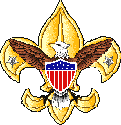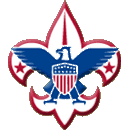| MERIT BADGES |
|
|
|
|
| Note: Eagle Required are in Italics |
"A"
American
Business
American Culture
American Heritage
American Labor
Animal Science
Archaeology
Archery
Architecture
Art
Astronomy
Athletics
Atomic Energy
Auto Mechanics
Aviation
"B"
Backpacking
Basketry
Bird Study
Bugling
"C"
Camping
Canoeing
Chemistry
Cinematography
Citizenship
Community*
Citizenship Nation*
Citizenship World*
Climbing
Coin Collecting
Collections
Communications*
Computers
Cooking
Crime Prevention
Cycling*
"D"
Dentistry
Disability Awareness
Dog Care
Drafting
"E"
Electricity
Electronics
Emergency
Preparedness**
Energy
Engineering
Entrepreneurship
Environmental
Science*
"F"
Family Life*
Farm Mechanics
Fingerprinting
Fire Safety
First Aid*
Fish & Wildlife Mgmt.
Fishing
Fly Fishing
Forestry
"G"
Gardening
Genealogy
Geology
Golf
Graphic Arts
"H"
Hiking
Home Repairs
Horsemanship
"I"
Indian Lore
Insect Studies
"J"
Journalism
"K"
"L"
Landscape Architecture
Law
Leatherwork
Lifesaving**
"M"
Mammal Study
Medicine
Metalwork
Model Design & Building
Motorboating
Music
"N"
Nature
"O"
Oceanography
Orienteering
"P"
Painting
Personal Fitness**
Personal Management*
Pets
Photography
Pioneering
Plant Science
Plumbing
Pottery
Public Health
Public Speaking
Pulp and Paper
"Q"
"R"
Radio
Railroading
Reading
Reptile & Amphibian Study
Rifle Shooting
Rowing
"S"
Safety
Salesmanship
Scholarship
Sculpture
Shotgun Shooting
Skating
Skiing
Small Boat Sailing
Soil & Water
Conservation
Space Exploration
Sports**
Stamp Collecting
Surveying
Swimming**
"T"
Textile
Theatre
Traffic Safety
Truck Transportation
"U"
"V"
Veterinary Medicine
"W"
Water Skiing
Weather
Whitewater
Wilderness Survival
Wood Carving
Woodwork
"X"
"Y"
"Z"
 Medicine MedicineRequirements 1991 |
- Discuss with your counselor the influence that EIGHT of the following people or events
had on the history of medicine:
- Hippocrates
- The invention of Gunpowder
- William Harvey
- Antoine van Leeuwenhoek
- Edward Jenner
- Florence Nightingale
- Louis Pasteur
- Gregor Mendel
- Joseph Lister
- Robert Koch
- Wilhelm Conrad Roentgen
- Marie and Pierre Curie
- Walter Reed
- Karl Landsteiner
- Alexander Fleming
- Jonas Salk
- Explain the Hippocratic Oath to your counselor, and compare to the original version to a more modern one. Discuss to whom those subscribing to the original version of the oath owe the greatest allegiance.
- Discuss the health care provider-patient relationship with your counselor, and the importance of such a relationship in the delivery of quality care to the patient. Describe the role of confidentiality in this relationship.
- Do the following:
- Describe the roles the following people play in the delivery of health care in your
state. (Note: Not all may exist in your state.)
- Physician
- Chiropractor
- Optometrist
- Podiatrist
- Pharmacist
- Psychologist
- Physician's assistant
- Nurse practitioner
- Nurse-midwife
- Registered nurse
- Licensed vocational/practical nurse
- Medical assistant
- Emergency medical technician
- Medical laboratory technologist
- Radiological technologist
- Physical therapist
- Occupational therapist
- Respiratory therapist
- Describe the educational and licensing requirements for five of those in 4(a) -- other than 4(a)(1) -- practicing health care in your state.
- Describe the roles the following people play in the delivery of health care in your
state. (Note: Not all may exist in your state.)
-
- Tell what is meant by the term "primary care" with regard to a medical
specialty. Briefly describe the types of work done by physicians in the following
"core" specialties:
- Internal medicine (a "primary care" specialty)
- Family practice
- Obstetrics/gynecology (a "primary care" specialty)
- Pediatrics (a "primary care" specialty)
- Psychiatry
- Surgery
- Describe the additional educational requirements for those specialties.
- Tell what is meant by the term "primary care" with regard to a medical
specialty. Briefly describe the types of work done by physicians in the following
"core" specialties:
-
- Briefly describe the types of work performed by physicians in FIVE of the following
specialties or subspecialties:
- Allergy/immunology
- Anesthesiology
- Cardiovascular disease
- Colon and rectal surgery
- Dermatology
- Emergency medicine
- Endocrinology and metabolism
- Gastroenterology
- Geriatric medicine
- Hematology/oncology
- Infectious disease
- Nephrology
- Neurological surgery
- Neurology
- Nuclear medicine
- Ophthalmology
- Orthopedic surgery
- Otolaryngology/head and neck surgery
- Pathology
- Physical medicine and rehabilitation/sports medicine
- Plastic, reconstructive, and maxillofacial surgery
- Preventive medicine
- Radiology
- Rheumatology
- Thoracic/cardiothoracic surgery
- Urology
- Vascular surgery
- Describe the additional educational requirements for the five specialties or subspecialties you chose in 6(a).
- Briefly describe the types of work performed by physicians in FIVE of the following
specialties or subspecialties:
-
- Visit a physician's office, preferably one who delivers "primary care." (This
may be that of your counselor.) Discuss the components of a medical history and physical
examination (an official BSA health form may be used to guide this discussion), and become
familiar with the instruments used.
- If this cannot be arranged, demonstrate to your counselor that you understand the components of a medical history and physical, and discuss the instruments involved.
- Describe the characteristics of a good diagnostic test to screen for disease (e.g., routine blood pressure measurement). Explain briefly why diagnostic tests are not perfect.
- Show how to take a blood pressure reading and a pulse reading.
- Visit a physician's office, preferably one who delivers "primary care." (This
may be that of your counselor.) Discuss the components of a medical history and physical
examination (an official BSA health form may be used to guide this discussion), and become
familiar with the instruments used.
- Do the following:
- Discuss the roles medical societies, the insurance industry, and the government play in influencing the practice of medicine in the United States.
- Briefly tell how your state monitors the quality of health care within its borders, and how it provides care to those who do not have health insurance.
- Compare and discuss with your counselor the health care delivery systems in the United States, Canada, and Mexico.
- Serve as a volunteer at a health-related event or facility in your community (e.g., blood drive, "health fair", blood pressure screening, etc) approved by your counselor.
|
||||||
Last Update May 15, 2023

.jpg)
